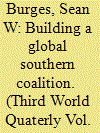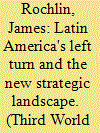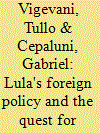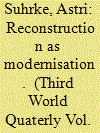|
|
|
Sort Order |
|
|
|
Items / Page
|
|
|
|
|
|
|
| Srl | Item |
| 1 |
ID:
079689


|
|
|
|
|
| Publication |
2007.
|
| Summary/Abstract |
This paper will set out the two very different regional leadership strategies being pursued by Brazil and Venezuela, concluding that it is the Brazilian neo-structuralist vision that will have more success than the Venezuelan overseas development aid approach. The two different approaches to Latin American leadership point to a substantive difference in how the regional system should operate in geopolitical and geo-economic terms, with the Brazilians favouring a market-oriented system in opposition to Venezuela's statist option. Contestation for regional leadership as set out in the article emerges as an early indicator of a chilling of relations between Brazil and Venezuela and points to a future scenario where other regional states may be able to play off contending would-be leaders.
|
|
|
|
|
|
|
|
|
|
|
|
|
|
|
|
| 2 |
ID:
079684


|
|
|
|
|
| Publication |
2007.
|
| Summary/Abstract |
Projected economic growth for China and India presents considerable opportunities and dilemmas for the African region, especially for human development, rights and security around its own growth centre, South Africa. This article juxtaposes a set of overlapping perspectives - emerging economies versus nics, fragile versus developmental states, new regionalisms, resource conflicts and new South - South relations - to analyse the present and prospective implications for sub-Saharan and South African development. Sustained Chinese and Indian growth may present opportunities, even windfalls, for some countries, companies, classes and sectors on the continent but not for all. This opens up a number of fundamental questions in terms of an expanded research agenda. Will Chinese and Indian multinational corporations and supply chains operate similarly or differently from familiar Anglo-American ones? Will civil societies within and diasporas around India and China affect their respective transnational relations? And will African regional institutions be able to moderate any negative impacts from these changing dynamics? Recent review articles have suggested that international relations (ir) in Africa is 'different'. But what is neglected is how the emerging relationship with China affects this assertion. The article concludes with reflections on implications for development policy and theory arising from 'drivers' such as China, India, and South Africa at the start of the new century. Our thesis is that, given growing divergences in Africa to sustain resource extraction, the emerging economies have to deal with fragile well as developmental states. Crucial in determining this outcome is whether or not the continent's single 'superpower' can facilitate or mediate this process given its own national interest and human development concerns
|
|
|
|
|
|
|
|
|
|
|
|
|
|
|
|
| 3 |
ID:
079688


|
|
|
|
|
| Publication |
2007.
|
| Summary/Abstract |
Latin America's leftward tide means a fresh landscape with regard to strategic affairs. Nowhere is this clearer than in the Bolivian case, where the election of Evo Morales and the rise of indigenismo signal a sweeping change in key matters of security, including those related to resource extraction, potential secession, and regional strategic realignment. The first half of this article is devoted to the context of political economy, which frames the appearance of new security themes. The second half of the piece analyses strategic changes that have accompanied a new economic model that features nationalisation and a radical redistribution of wealth.
|
|
|
|
|
|
|
|
|
|
|
|
|
|
|
|
| 4 |
ID:
079687


|
|
|
|
|
| Publication |
2007.
|
| Summary/Abstract |
The objective of this article is to analyse the changes brought about by the foreign policy of Lula's first administration (2003 - 06). To discuss the topic, we will make use of three notions: autonomy through distance, autonomy through participation and autonomy through diversification. These notions explain the main changes occurring in Brazilian foreign policy from 1980 to the mid-2000s. We will conclude by demonstrating how the autonomy through diversification notion best applies to the 2003 - 06 period
|
|
|
|
|
|
|
|
|
|
|
|
|
|
|
|
| 5 |
ID:
079685


|
|
|
|
|
| Publication |
2007.
|
| Summary/Abstract |
Developing an argument based in theories of democratic consolidation and religious competition, and discussing the reasons for the secularist opposition to the government, this article analyses how government by a party rooted in moderate Islamism may affect Turkey's peculiar secular democracy, development and external relations and how Muslims in the world relate to modernization and democracy. Arguing that secularism in advanced democracies may be a product of democracy as much as it is the other way around, the article maintains that democratic consolidation may secure further consolidation of Turkish secularism and sustainable moderation of Turkish political Islam. Besides democratic Islamic - conservative actors and other factors, democratic consolidation requires strong democratic - secularist political parties so that secularist and moderate Islamist civilian actors check and balance each other. Otherwise, middle class value divisions and mistrust in areas like education and social regulation may jeopardise democratisation and economic modernisation and continuing reconciliation of Islamism with secular democracy and modernity
|
|
|
|
|
|
|
|
|
|
|
|
|
|
|
|
| 6 |
ID:
079683


|
|
|
|
|
| Publication |
2007.
|
| Summary/Abstract |
This article draws attention to the ideological role that the neoliberal discourse on corruption has fulfilled in the promotion of the second generation reforms in Southern countries since the 1997 East Asian financial crisis. This discourse is ahistoric insofar as it fails to recognise corruption as a problem of modernity; biased insofar as it associates corruption with Southern countries' historical and cultural specificities only; contradictory in terms of its counter-productive anti-corruption strategies; and politicised as it has redefined 'corruption' as 'rent-seeking'. In the absence of alternative radical conceptualisations, this essentially competition-induced neoliberal orthodoxy on corruption has been easily articulated within morality-based popular concerns in domestic politics and hence acquired a hegemonic capability. The article substantiates these arguments by examining the trajectory of the neoliberal anti-corruption agenda in Turkey with a particular focus on the developments of the post-2001 financial crisis period
|
|
|
|
|
|
|
|
|
|
|
|
|
|
|
|
| 7 |
ID:
079686


|
|
|
|
|
| Publication |
2007.
|
| Summary/Abstract |
This paper examines the post-war reconstruction programme in Afghanistan, arguing that it contains the seeds of radical social change. The paper analyses the tensions of the present reconstruction project in light of the past experience of similar programmes launched by Afghan rulers and their foreign supporters. The central argument is that the conflation of post-war reconstruction with a broader agenda for development and modernisation has brought out a wide range of tensions associated with social change. Simultaneously the prominent foreign role in the undertaking has increasingly had negative effects. As a result, the entire project shows signs of severe contradictions that are adding to the problems caused by the growing insurgency.
|
|
|
|
|
|
|
|
|
|
|
|
|
|
|
|
| 8 |
ID:
079690


|
|
|
|
|
| Publication |
2007.
|
| Summary/Abstract |
As a tool for understanding the world in which we live the study of the history of political thought is stunted because of a preoccupation with the Western canon as the history of political thought to the exclusion of other histories and traditions. This ongoing exclusion is itself facilitated by a deeply entrenched select reading of the Western canon; a reading that overlooks a tendency within the canon to not just ignore but suppress and dismiss the value of other accounts of history and traditions of thought. An opening of the Western mind to these assumed to be alien traditions of social, legal and political thought reveals that, in the global market place of ideas, these purportedly competing and non-compatible traditions of thought might in fact have considerably more in common than what sets them apart: thus opening the way for an authentic inter-civilisational dialogue that focuses more on co-operation and less on clashes
|
|
|
|
|
|
|
|
|
|
|
|
|
|
|
|
| 9 |
ID:
079682


|
|
|
|
|
| Publication |
2007.
|
| Summary/Abstract |
One of the most striking trends in global development finance has been the growing role of Western-based, institutional investors. Pension funds in particular have played a leading part in supplying capital to publicly traded corporations in emerging market economies. An important feature of this type of financing has been the trend to make investment conditional not only on sound economic fundamentals, but also on a series of non-financial (or social) risk indicators (eg meeting labour standards and human rights). Despite the significance of non-financial benchmarking, these strategies have not been subjected to critical analysis, especially with regard to their wider impact on the reproduction of the mainstream development paradigm. This article addresses this gap by focusing on the benchmarking strategies of one of the world's largest pension funds: the California Public Employees' Retirement System (Calpers). Calpers's rating instrument, the Permissible Country Index (pci), employs both financial and non-financial risk indicators to screen its investments in 27 emerging markets. I argue that, despite its progressive sheen, the pci not only reproduces but also reinforces neoliberal forms of discipline and exploitation in the global South. It does this through coercive measures, such as divestment (ie removing a country from the pci), as well as through the construction of specific forms of knowledge that act to normalise the expansion and restructuring of spaces of capital in the global South
|
|
|
|
|
|
|
|
|
|
|
|
|
|
|
|
|
|
|
|
|